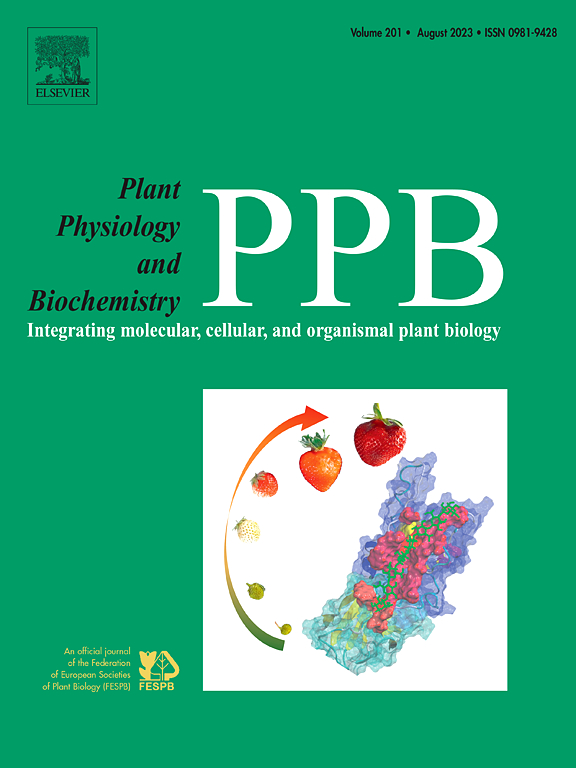Identification and characterization of SWEET gene family in passion fruit reveals the involvement of PeSWEET3 in soluble sugar accumulation
IF 6.1
2区 生物学
Q1 PLANT SCIENCES
引用次数: 0
Abstract
The sugars will eventually be exported transporters (SWEET) family is a class of sugar transporters that play crucial roles in plant growth, reproduction, and stresses response. The characteristics of 21 PeSWEETs, identified in passion fruit (Passiflora edulis Sims) and divided into four clades, were evaluated. Structural feature analysis showed that exon numbers ranged from 4 to 12, while motif 1, 2, and 3 were highly conserved. Analysis of RNA-seq from different tissues revealed that PeSWEETs showed tissue-specificity. Additionally, Cis-acting regulatory element analysis indicated that abundant hormone-response and stress response elements were enriched in promoters of PeSWEETs. Exogenous abscisic acid (ABA) treatment led to an increase in the soluble sugar accumulation and up-regulated the expression level of PeSWEET3. The PeSWEET3 protein localizes on the plasma membrane and exhibits transport activity of fructose, glucose, and mannose. Furthermore, ectopic expression of PeSWEET3 significantly enhanced soluble sugar accumulation in leaves of transgenic tobacco. Collectively, these results lay a solid foundation for further exploration on the role of PeSWEETs.
百香果SWEET基因家族的鉴定和特征揭示了PeSWEET3参与可溶性糖积累
SWEET转运蛋白家族是一类糖转运蛋白,在植物生长、繁殖和逆境反应中起着至关重要的作用。对从百香果(Passiflora edulis Sims)中鉴定出的21种PeSWEETs的特征进行了评价,并将其分为4个支系。结构特征分析表明,外显子数在4 ~ 12之间,motif 1、motif 2和motif 3高度保守。来自不同组织的RNA-seq分析显示,PeSWEETs具有组织特异性。此外,顺式调控元件分析表明,在PeSWEETs的启动子中富集了丰富的激素反应和应激反应元件。外源ABA处理增加了可溶性糖积累,上调了PeSWEET3的表达水平。PeSWEET3蛋白定位于质膜上,表现出果糖、葡萄糖和甘露糖的转运活性。此外,异位表达PeSWEET3显著提高了转基因烟草叶片中可溶性糖的积累。这些结果为进一步探索PeSWEETs的作用奠定了坚实的基础。
本文章由计算机程序翻译,如有差异,请以英文原文为准。
求助全文
约1分钟内获得全文
求助全文
来源期刊
CiteScore
11.10
自引率
3.10%
发文量
410
审稿时长
33 days
期刊介绍:
Plant Physiology and Biochemistry publishes original theoretical, experimental and technical contributions in the various fields of plant physiology (biochemistry, physiology, structure, genetics, plant-microbe interactions, etc.) at diverse levels of integration (molecular, subcellular, cellular, organ, whole plant, environmental). Opinions expressed in the journal are the sole responsibility of the authors and publication does not imply the editors'' agreement.
Manuscripts describing molecular-genetic and/or gene expression data that are not integrated with biochemical analysis and/or actual measurements of plant physiological processes are not suitable for PPB. Also "Omics" studies (transcriptomics, proteomics, metabolomics, etc.) reporting descriptive analysis without an element of functional validation assays, will not be considered. Similarly, applied agronomic or phytochemical studies that generate no new, fundamental insights in plant physiological and/or biochemical processes are not suitable for publication in PPB.
Plant Physiology and Biochemistry publishes several types of articles: Reviews, Papers and Short Papers. Articles for Reviews are either invited by the editor or proposed by the authors for the editor''s prior agreement. Reviews should not exceed 40 typewritten pages and Short Papers no more than approximately 8 typewritten pages. The fundamental character of Plant Physiology and Biochemistry remains that of a journal for original results.

 求助内容:
求助内容: 应助结果提醒方式:
应助结果提醒方式:


